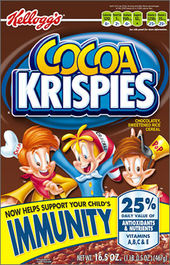
Of all claims on cereal boxes, "this one belongs in the hall of fame," says Kelly Brownell, director of Yale University's Rudd Center for Food Policy and Obesity. "By their logic, you can spray vitamins on a pile of leaves, and it will boost immunity."
As the H1N1 virus worries parents and threatens children, the claim of supporting immunity is compelling to many. But it comes at a time food makers are being held more accountable for claims. The industry's self-created "Smart Choices" nutrition-labeling program was voluntarily halted recently after federal regulators expressed concern that such programs may be misleading.
Last week, San Francisco sent a letter to Kellogg and to the Food and Drug Administration asking Kellogg to prove its claim. "I am concerned the prominent use of the immunity claims to advertise a sugar-laden chocolate cereal like Cocoa Krispies may mislead and deceive parents of young children," said Dennis Herrera, the city attorney.
Kellogg says the critics are wrong. Development of the line started more than a year ago, and it was rolled out in May 2009. "It was not created to capitalize on the current H1N1 flu situation," spokeswoman Susanne Norwitz says. "Kellogg developed this product in response to consumers expressing a need for more positive nutrition."
Since studies showed that antioxidant vitamins A, C and E play an important role in the immune system, Kellogg increased its amount in the line - which includes Rice Krispies - from 10% daily value to 25% daily value, Norwitz says.
"The idea that eating Cocoa Krispies will keep a kid from getting swine flu, or from catching a cold, doesn't make sense," says Marion Nestle, nutrition professor at New York University. "Yes, these nutrients are involved in immunity, but I can't think of a nutrient that isn't involved in the immune system." Nestle saw the claims at a grocery store in August and sent a letter to the FDA. She hasn't heard back.
The FDA has jurisdiction over false or misleading labeling. FDA officials are not permitted to discuss specific cases under consideration and declined to comment on this one.



Reader Comments
to our Newsletter